1-21-22
Juho Kuosmanen’s Compartment No. 6—Snow Angels on a Train
By Diane Sippl
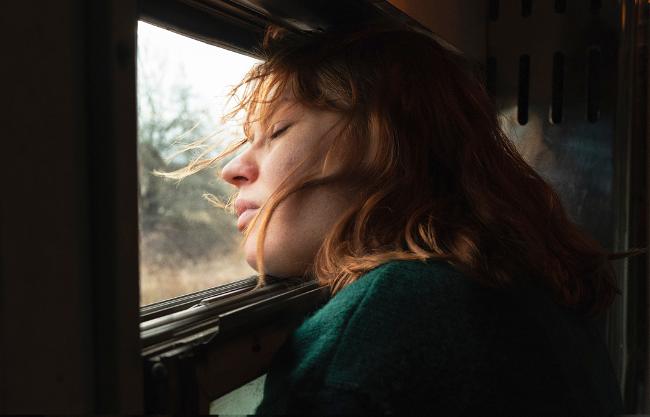
Road movies are often about freedom. In a car, you can go where you want, every crossroad is a possibility. But I tend to think that freedom isn’t an endless number of options but rather, the ability to accept your limitations. A train ride is more like destiny. You can’t decide where to go, you just have to take what it gives you.
Juho Kuosmanen
Imagine yourself amid two currents—one pulling you back, to what you don’t want to call the past, so you carry it furiously with you, and another meeting you head-on, prodding you into an unknown future. You’re spinning in an eddy of your own emotions that you have yet to sort out. You are a free agent, boldly embarking on an esoteric adventure: to get a look at the petroglyphs at the Arctic port of Murmansk in the dead of winter. Most would call it a fool’s errand and balk at the danger of blizzards, gale winds, icy roads, and dark days. Yet Laura (Seidi Haarla), our protagonist, sees her most tangible obstacle at arm’s length—a scrappy drunkard who shares her sleeping cabin on the train from Moscow, a Russian miner (Yuriy Boriso) who taunts her for being an Estonian woman (okay, Finnish, but equally suspect) traveling alone. He’s crass and in her face (more like, at her crotch) until she pushes him over and leaves the cabin. But let’s back up.
The film doesn’t start there, but at a farewell party given for her by a Moscow literature professor, Irina (Dinara Drukarova). The first words of dialogue are recited by an off-screen guest as Laura, younger than the others, enters the party with her back to us: “To escape, you need to firmly know not where you are running, but from where.” A colleague recognizes it as a quote from Victor Pelevin’s Chapayev and the Void. Irina proposes a toast, announcing that Laura will be departing in the morning for her journey to the North. “Who is she?” whispers one member of the swank crowd. “Irina’s lodger,” replies another. They’ve all been playing a scholar’s game of word volley, Name that Author. Irina comes up with a coy quote (in Russian): “Only parts of us will ever touch only parts of others.” Laura, hoping to fit in, guesses “Anna AkhmatOva.” “It’s pronounced AkhMAtova,” quips the man beside her. Then Irina repeats the quote in English (showing off her own linguistic abilities.) “No one? It’s Marilyn Monroe!” A sexy joke from a woman who appears to enjoy Laura as a sex-mate, it playfully announces the theme of the film, but in a most ironic way, because we are about to see how co-writer and director Juho Kuosmanen quietly subverts the “strangers-on-a-train” genre for something deeper, swapping the conventional suspense driven by sex and romance for a fresh curiosity guided by openness and sensitivity.
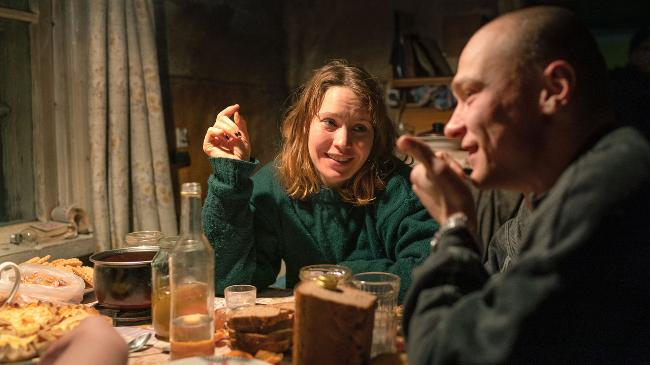
…when you meet someone new, there is the opportunity to re-start, to pretend to be something that you would like to be. Or a chance to open up, to learn something new about yourself. There is a certain kind of “comfort in strangers.” Depending on their gaze and the presence of the other, you either start to pretend or you might let go and finally just be yourself.
Juho Kuosmanen
When Laura first enters her assigned train cabin, Ljoha is the only other passenger. He slobbers his alcohol on the floor as he drinks, his cigarette ashes go flying to her face as he bellows at her, and in a drunken drawl he asks her how you say “I love you” in Finnish. She smirks, “It’s haista vittu” (“fuck you”), and he declares it to her proudly, exhaling his smoke into her eyes. Apparently, in his semi-stupor, he learns the words, because he uses them again later. But for now, it’s all Laura can do to make it over to the conductor and insist, “I can’t stay there. I can’t sleep there.” The woman replies stolidly: “Do you think you have a choice?”
On the ride from Moscow to St. Petersburg, Ljoha follows Laura to the dining car and presumes to show another side of himself. He works in the mine near Murmansk, but he’s saving his wages to open a “bureau” and become a businessman. Laura does her own bit of posing—as a sophisticated archaeologist off to do her research. She tells him yes, she has a boyfriend, a literature professor. Yet in stolen moments of solitude, Laura mostly mopes that Irina, the joy of her life, isn’t sitting beside her. She re-plays her videotape of the party, and she shoots banal images from the train to send to her lost love. A train is the perfect vehicle for these flashes in motion, but they begin to add up to something else. The film is punctuated by a several phone calls from Laura to Irina, each one casting a thicker pall over her relationship. Meanwhile the fleeting images carry us along swiftly enough to a variety of stops, visits, and visitors.
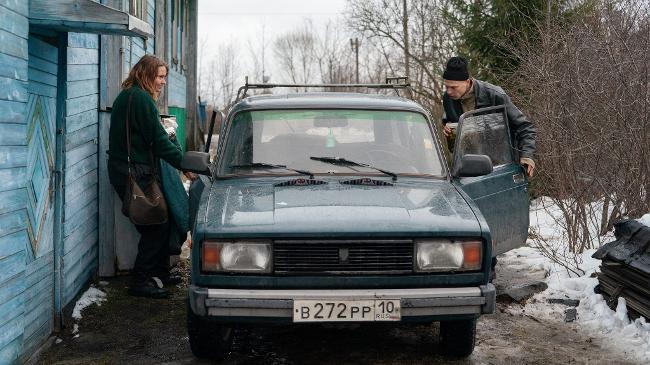
At an overnight train stopover north of St. Petersburg, Ljoha actually manages to coax the “real” adventurer out of Laura and whisk her off, in the black of night down an icy road after a swig of vodka as he takes the wheel, to meet an old woman he knows in a small village. The Russian-style stove is the center of her humble home, which is like a cocoon compared to Irina’s salon, with a wooden nook for a kitchen table, spread with home-made breads and pies, and a cubby-hole of a bedroom, where Laura doses off after Ljoha has already napped and is outside chopping wood for this foster mother. In their banter and laughter, the woman makes a toast to Laura, not one like Irina’s, “To my lovely Finnish friend who’s traveling far away…,” but one to Laura’s “inner animal.” In her late fifties, she tells Laura, “There is a small animal inside each woman. You have to learn to live with it and trust it. Do what your inner self tells you.” In parting with Laura, loading her arms with pickles and lunch, she tells her, “You’ve found a good man for yourself.” Laura laughs as, inside the car, she watches Ljoha hot-wire the stolen vehicle to get it started once again. “You think I’m a bad guy?” he asks. “Well, I only know what I’ve seen” is all she can muster.
It’s enough. However, a visitor on the train complicates this budding friendship. He’s a tall, dark, and handsome Finn, and when Laura invites him to share their cabin, he takes it upon himself to serenade her with his guitar. In the warm glow of this come-on, Ljoha becomes finicky. Like a troubadour, he sings, “I feel it in my fingers, I feel it in my toes. Love is all around me, and so the feeling grows….” His head rocks back and forth and he closes his eyes as he strums. This sentimental performance of the Troggs oldie feels like a touch of the New Sincerity movement. But guess again. Ljoha has left the cabin as the train pauses, and through the window Laura sees him shadowboxing on the tracks. He makes snowballs, tosses them into the air, and slipping and sliding in the slush, he tries to kick them and sock them with his fist.
It only gets worse. Laura opts to go out for a walk with the Finn, when he remarks that Ljoha seemed to have a “situation,” and he tosses off the remark, “There must be a factory around here where they make guys like him.” Saska, the Finn, wears his antagonism of Russians, workers, and rivals on his shirtsleeve, just as he literally gets “cold feet” on their walk when Laura chooses to follow a barking dog to a back garage where three Russians, drinking, send her off with two bottles of their brew. “It’s a gift. Must be fate. Take what you can get!” they reassure Laura. Returning to the train, she bids farewell to her countryman, and upon entering her cabin again as the engine starts up, preparing to videotape Ljoha in his sleep, she cries, “He’s taken my camera!” Ljoha watches her sob. “You mean, stole it.” Her tapes as well.
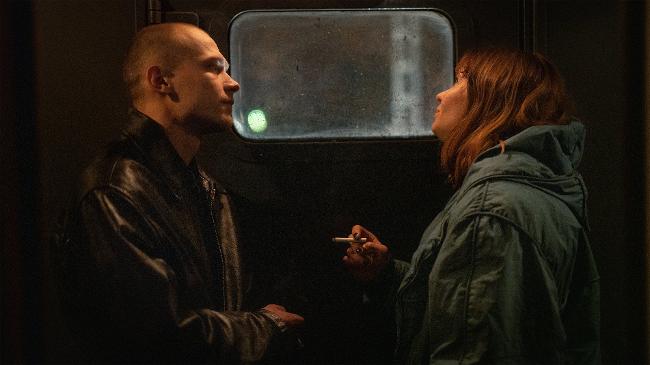
All we have is those fleeting moments; everything that matters is temporary. If we chase something ‘eternal’, we might lose what we have now.
Juho Kuosmanen
Then comes a spellbinding shot-sequence a full minute long, in eerie silence but for the low screeching of the train as it pulls toward us off the screen, our point of view (and Laura’s state of mind) looking back over the tracks, watching her “whole Moscow” recede once again, this time not physically as it did when she first embarked, but in tangible memory, now that her videotape is gone for good. The movement of the train, center frame, acts as a refrain for the initial departure, except that now Moscow is quite a distance away, and a new emotional distance, even as Laura recollects it in sighing words for Ljoha. In the background, the red and yellow railway lights gradually pale in the dark of the night as Laura paints the picture of what was: “People. Parties. Flats. Laughter. Music. I loved it all.”
It’s a turning point in Compartment No. 6, because after a brief attempt in the dining car with Ljoha to celebrate “the end of the road,” from now on Laura’s journey will be by taxi, private car, and boat. As it turns out, these privately hired vehicles function very differently from the train—they are commissioned by stubborn will, to serve her individual need. But what is it? To see the petroglyphs? That’s what she tells herself. And she doggedly pursues that motive. But there’s something else along the way—there always is, in a real journey. It comes with more trouble, of course. Yet isn’t any real journey worth the trouble? The film is about awkward transitional states. We keep seeing the reality, while Laura keeps seeing the wish and the hope, the illusion as reality. Ljoha somehow knows this and either decidedly gives up or can’t face his loss. Yet while she is burdened by nostalgia, he is the truly lyrical soul, the forward inspiration for any back-pedaling hesitation.
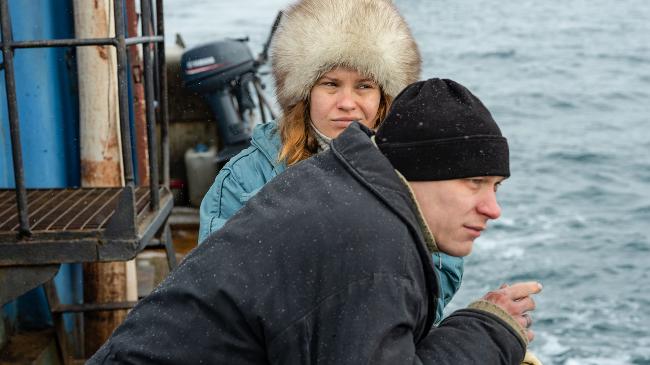
One of the most breath-taking scenes of the film offers a wide, panoramic shot of Laura’s taxi on the road across the mountain side to Olenegorsk GOK in the dark, beginning with lights reflecting on the water, a horizontal golden string across our whole screen, the chiseled rock covered with icy snow on the flat vertical face of a quarry, the moving car looking like a tiny firefly in the night. Laura leaves a note with a workman at the site. Cut to black screen. It’s not the end of the film; there is more to come, a truly beautiful “more,” but this journey to the mine becomes the real journey, for her and for us.
Freud called it “the uncanny”; for Dostoevsky is was “the double”—that most uncomfortable feeling of familiarity with a stranger, maybe not even a doppelgänger, but another version of yourself, an alter-ego you are not ready to discover and accept, who is nonetheless hard to resist. In subtle ways, the entire film turns upon this very device, motifs that are not mere repetitions but parallels, reversals, and commentaries on each other, each an ironic déjà vu of its original counterpart. Some of these are funny, if we count scenes bringing Chekhovian “laughter through tears”—Ljoha’s air-boxing as a silent parody of Laura’s inner struggle, and his initial “language lesson” from her that makes a mighty comeback in the film’s finale; some refrains are filled with pathos—Ljoha’s flight in the face of saying goodbye on three separate occasions, succinct and inverted reminders of Laura’s three phone calls in which she defiantly clings to Irina, Moscow, memories. Laura’s and Ljoha’s paired drawings of each other can be read as personal petroglyphs to fend off the “death” of true friends when no rock carvings can speak in such a way.
As for the petroglyphs, do they serve merely as a MacGuffin (reminding us that Hitchcock himself knew the term from a story of two passengers on a train)? Maybe not. After all, the film’s dialogue twice tells us, first by a seemingly erudite scholar at the opening party and then later, palmed off by Irina on the train as a way of expressing a sophisticated self to Ljoha: viewing the petroglyphs is “a natural need. It’s important for us to know where we come from. It’s easier to understand the present if you know the past.” Yet compare this to the note of sarcasm in Laura’s voice at the party: “Yes, of course, I’m very excited to go there and see the petroglyphs.” What she was not prepared to do was to understand her present, especially by knowing her past. Juho Kuosmanen puts it this way:
People make crazy statues and carvings to leave a mark on the world as proof that they existed. But what Laura and Ljoha experience during this journey, will also leave a deep mark in both of them. Compartment No. 6 is my petroglyph. Hopefully staying around long after I’m gone. Perhaps only to say, we were there, we shot those scenes. We were alive and had lots of fun.
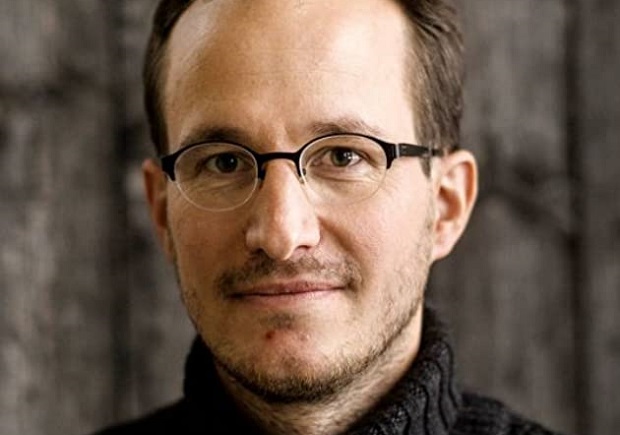
Compartment No. 6
Director: Juho Kuosmanen; Screenplay: Andris Feldmanis, Livia Ulman, Juho Kuosmanen, Inspired by the novel Compartment No. 6 by Rosa Liksom; Producers: Jussi Rantamäki, Emilia Haukka / Aamu Film Company; Cinematographer: J-P Passi; Editor: Jussi Rautaniemi; Sound: Pietu Korhonen; Set Design: Kari Kankaanpää;Costume Design: Jaanus Vahtra.
Cast: Seidi Haarla, Yuriy Boriso, Dinara Drukarova, Julia Aug, Lidia Kostina, Tomi Alatalo, Viktor Chuprov, Denis Pyanov, Polina Aug
Color, 35mm, Widescreen, 107 minutes, in Russian, Finnish, English with English subtitles.